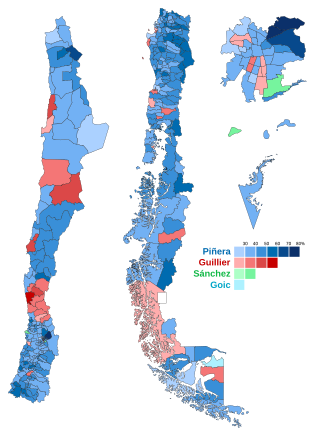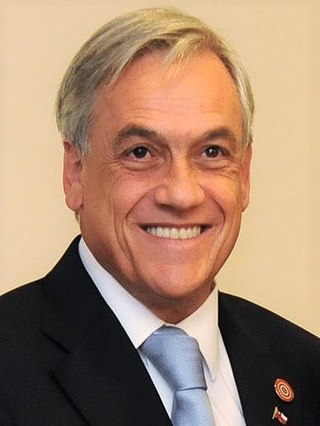
National Renewal is a liberal conservative political party in Chile. It is a member of Chile Vamos, a centre-right to right-wing coalition. Sebastián Piñera, the former President of Chile, was a member of the party.

Luciano Cruz-Coke Carvallo is a Chilean actor, and was the Minister of Arts and Culture under the 35th President Sebastián Piñera.

General elections were held in Chile on 19 November 2017 to elect the president, all 155 members of the Chamber of Deputies, 23 of the 43 members of the Senate and 278 members of regional boards. All elected members would serve a four-year term, aside from the senators would serve for eight years.

Chile Vamos is a centre-right to right-wing political coalition of three political parties in Chile. The coalition was created on 29 January 2015 by the general secretaries of the Independent Democrat Union (UDI), National Renewal (RN), Democratic Independent Regionalist Party (PRI) and Political Evolution (Evópoli).

The Broad Front was a Chilean political coalition founded in early 2017, composed of left-wing parties and movements. Its first electoral contest was the 2017 Chilean general election, where their presidential candidate Beatriz Sánchez came third with 20% of the vote in the first round of election. The Broad Front also expanded their electoral representation to 20 deputies, 1 senator and 21 out of 278 Regional Councillors, thus consolidating the movement as the 'third force' in Chilean politics.

The Chilean presidential primaries of 2017 were held in Chile on Sunday 2 July 2017. It was the first election in the country's history in which Chileans were permitted to vote from abroad.
Citizens was a Chilean political party founded in 2013, with members comprising militants and independents of the center and center-left whose beliefs did not align with New Majority or Chile Vamos. Party militants mainly came from the Christian Democratic Party and the Party for Democracy.
Sumemos was a Chilean political coalition that brought together two parties and a liberal centrist political movement. It was officially presented on January 13, 2016, in an event held in the building of the former National Congress of Chile.

José Antonio Kast Rist, also known by his initials JAK, is a Chilean lawyer and politician. Kast ran for president in 2021, winning the first round and losing in the second round run-off to Gabriel Boric.

A constitutional referendum was held in Chile on 25 October 2020. The referendum asked the citizens whether they wanted a new constitution to be drafted, and if so, whether it should be written by a constitutional convention made up of directly elected citizens or by a mixed convention that was composed of currently serving members of Parliament and half of directly elected citizens. The "Approve" side won by a landslide, with 78% of voters agreeing to draft a new constitution. When it came to deciding how the new text should be written, 79% of voters opted for a "Constitutional Convention." The voter turnout was 51%.

General elections were held in Chile on 21 November 2021, including presidential, parliamentary and regional elections. Voters went to the polls to elect the President of the Republic to serve a four-year term, 27 of 50 members of the Senate to serve an eight-year term in the National Congress, all 155 members of the Chamber of Deputies to serve a four-year term in the National Congress, and all 302 members of the regional boards to serve a three-year term. Following an electoral reform in 2015, the Senate increased its membership from 38 to 43 in 2017 and grew to its full size of 50 seats after this election.

Felipe José Kast Sommerhoff is a Chilean economist, researcher, consultant, and politician.

Sebastián Iglesias Sichel Ramírez is a Chilean lawyer, professor, ex minister of State and politician who served as president of the Banco del Estado de Chile from June 2020 until December 2020. He also previously served as Minister of Social Development and Family and executive vice president of Corfo under the second government of Sebastián Piñera. He was an independent candidate in the 2021 Chilean presidential election who ran under the centre-right Chile Podemos Más coalition.

Mario Guillermo Desbordes Jiménez is a Chilean politician and former police officer of Carabineros de Chile. He became the Minister of Defense in July 2020.
Stéphanie Alenda is a French sociologist known by her book, articles and columns about the Chilean right-wing, a field which Alenda focused on three aspects: social, subsidiarity and liberalism, as reflected in times of change within Chile.

Hernán Larraín Matte is a Chilean lawyer and politician involved in centre-right politics. Larraín is an adjunct professor at the Adolfo Ibáñez University and during Sebastián Piñera's first government (2010–2014) he was presidential advisor. Then, he presided political party Evópoli (2018–2020).

Gloria de los Ángeles Hutt Hesse is a Chilean politician and journalist and a member of Political Evolution (Evópoli/EVOP), a conservative-liberal and centre-right party.

Pablo Andrés Kast Sommerhoff is a Chilean architect and politician, member of Evópoli.

Gonzalo Armando de la Carrera Correa is a Chilean politician who was elected as deputy on 21 November 2021. Militant of the National Libertarian Party founded by Johannes Kaiser. He formerly was militant in the conservative Republican Party, he considers himself as liberal inside José Antonio Kast's party. Similarly, he was a militant of Evópoli, party from which he resigned in 2019.
















